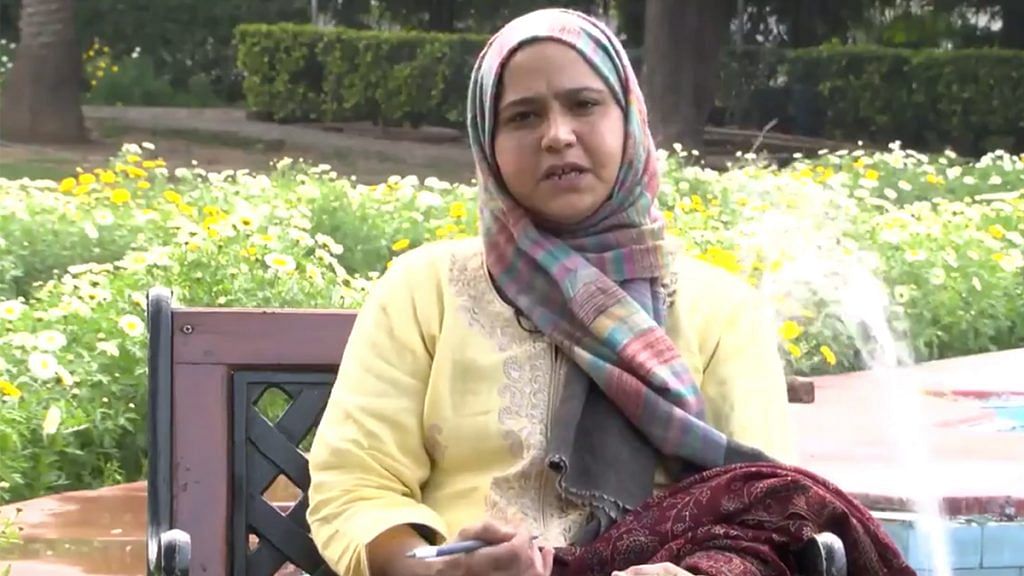Srinagar: Awards usually bring a sense of fulfillment. But for 33-year-old Srinagar entrepreneur Arifa Jan, one of the seven women chosen to handle Prime Minister Narendra Modi’s Twitter account on International Women’s Day, the Nari Shakti Puraskar 2019 highlighted a sense of urgency, and also hope.
Jan has spent nearly the entire past decade trying to revive the manufacturing of Namdah, a traditional rug in Jammu and Kashmir. But as the Modi government shut down internet in the state for over eight months after scrapping Article 370 in August last year, she struggled to keep her business afloat.
On International Women’s Day Sunday, President Ram Nath Kovind presented Jan with the government recognition, among 14 other awardees. And it was her contribution towards the Kashmiri crafts industry that prompted the Modi government to take notice of her.
For Jan, along with the recognition, the award was also an opportunity to meet PM Modi for a brief interaction.
In a hesitant conversation that was aired publicly, she broached the uncomfortable subject. “But when internet was shut, everything (her business) was ruined,” Jan told the PM, as he carefully listened, before she broke into a nervous laugh.
#WATCH Delhi: Arifa from Kashmir shares her success story during an interaction with Prime Minister Narendra Modi after receiving 'Nari Shakti Puraskar'. She says,"Generally, it's hard for entrepreneurs from grassroots to get appreciation". pic.twitter.com/dwKEZHx2sn
— ANI (@ANI) March 8, 2020
She went on to appreciate the government for recognising “grassroots entrepreneurs”.
I always dreamt of reviving the traditional crafts of Kashmir because this is a means to empower local women.
I saw the condition of women artisans and so I began working to revise Namda craft.
I am Arifa from Kashmir and here is my life journey. #SheInspiresUs pic.twitter.com/hT7p7p5mhg
— Narendra Modi (@narendramodi) March 8, 2020
In a post-event meet, Jan declined to answer questions when asked for her views on the Article 370 move.
Speaking to ThePrint, Jan said, “I didn’t want to talk about politics. I think it should be obvious that the internet ban benefited no one. Look around in Kashmir everyone suffered and so did I. Had to lay off my employees, shut my units. My customer couldn’t reach me or shop our products online.”
While she expressed hope that the government will provide support, her own journey has been about resilience and persistence.
Also read: J&K LG Murmu invites Gujarati businessmen to invest in newly-created UT
How the young Kashmiri ran her business
Arifa Jan, a postgraduate from Srinagar’s Craft Development Institute (CDI), started her first handicrafts business unit in Srinagar in 2012. She employed five women to make Namdahs.
Unlike Kashmiri carpets that are woven, a Namdah is a felted rug that is used widely in furnishing.
Soon, the number of employees at Jan’s first unit went from five to 15. In addition to reviving the traditional craft, Jan mostly engaged women and paid good wages to her artisans who specialised in embroidery and pashmina work.
“I also took a cue from the growing online shopping sector and developed an international clientele from US, Australia, Finland and other countries over the years,” she said.
After returning from a women entrepreneurship programme by the United States State Department in 2014, Jan established two other units in Srinagar’s Noorbagh and Nawa Kadal localities, taking the number of women engaged by her to 68.
On her struggle to secure funding, Jan said, “Before establishing the Noorbagh and Nawa Kadal units, I must have visited government offices thousands of times asking for loans or funding to help me build my work but hit a wall each time.
“Finally, I managed to meet former J&K CM Mehbooba Mufti on whose recommendation a loan of Rs 13 lakh was sanctioned from the Waqf board. However I only got one installment of Rs 4 lakh after which I had to shell out all the money from my own pockets,” she added.
“I managed to build two units on my own,” said Jan.
However, her business came to a standstill on 4 August 2019 when the Modi government clamped down on all forms of communications. The blackout severed Jan’s ties with her customer base, which mostly exists abroad.
While the ban on internet was partially restored in January, by then she had already been forced to shut down two out of her three units — now she only had 15 employees left.
‘Waiting for a call’
Days after internet was restored in Jammu and Kashmir, she found herself winning the Nari Shakti Puraskar 2019.
The award has imbued fresh hope and energy in Jan and dozens of other women but she only has 15 employees who rely on the young entrepreneur for their livelihood.
“I feel responsible for all the women who used to work with me. Ever since I have won the award I keep staring at my phone. I am waiting for a call from someone from the central government offering their support,” she said.
“My business has taken a major hit and the award has now given me some hope that I can pick up from where I left and undo some of the damages done to me and other women who work with me,” she added.
Jan expressed hope of receiving support from Union Minister for Textiles and Women & Child Development, Smriti Irani, who was present at the Delhi event. “Union Minister Smriti Irani told me that I will be given the support I need to carry forward the trade. Now all I can do is wait,” Jan said.
Also read: Former PDP, NC leaders launch ‘Apni Party’ in Jammu and Kashmir, BJP welcomes move
